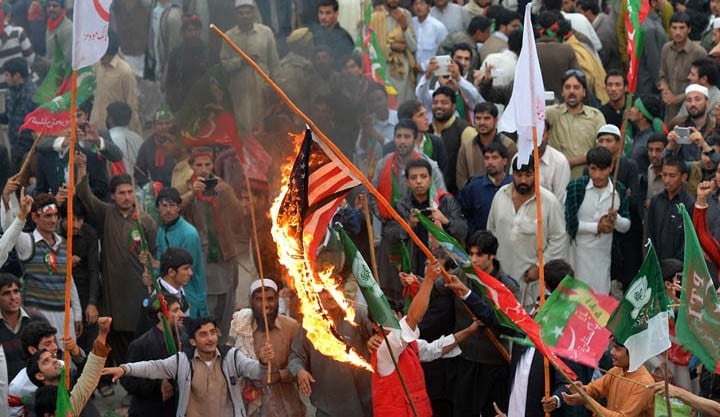

The PTI has decided that it’s time for action. It has announced that Nato supply containers to and from Afghanistan via Khyber Pakhtunkhwa would be stopped at the border points. In its various demonstrations and dharnas (sit-ins), attended by the chairman Imran Khan himself, the party has declared that its teams would stop Nato supplies from entering into the province at any point -- including Khairabad, Charsadda, Bannu, Dera Ismail Khan and Hangu. It claims this blockade of Nato supply would continue till the US stopped its drone attacks on the Pakistani soil.
The news coming from the Peshawar sit-in is that the PTI’s tabdeeli razakars (volunteers for change) have been acting as the police as well as the court. They have been stopping trucks and forcefully checking their documents -- creating law-and-order problem for their own government in KP. Reportedly, the government has registered FIRs against the erring workers.
Though PTI has taken some promising steps to give relief to the people since the May election, its political narrative revolves around nationalism and religion. The way the party links terrorism with drone attacks and drone attacks with Nato supply lines is an example of it.
Dr Khadim Hussain, a Peshawar-based political analyst, analyses the PTI’s discourse as based on fascism and isolation -- using ‘ghairat’ as a symbol to spread hatred against the whole world. He thinks the PTI that talks about political, social and economic autonomy doesn’t need to rely on hatred against the West and India to become a good nation. "PTI is also against pluralism. It wants everybody to think like it and, if that’s not the case, it labels them as either agent or corrupt."
The party is drifting towards isolation -- with no political allies other than Jamaat-e-Islami and Jamatud Dawa. In a recent interview with NDTV, Imran Khan justified his alliance with Hafiz Saeed, saying that political parties that don’t follow a policy of boycotting people and politicians can strike a deal with whoever they think is politically viable. "If I, as a politician, share stage with a violent organisation, what’s wrong with that?" Khan asked naively during the interview. He went on to say that the superior courts of Pakistan are the forums where Hafiz Saeed’s involvement in the 26/11 should be determined.
If its workers stop truck drivers and check their documents it means they are taking the law in their hands. "If they think that Nato supply line is an issue of the federal government and they would create problems for them on the international level, they are actually committing treason," says Hussain.
Political commentator, Raza Rumi, believes Khan’s party is emerging as a mainstream rightwing political force in Pakistan subsuming and replacing all the religious parties. The PTI has appropriated their agenda which is anti-West, hypernationalist and which seeks to create an Islamic state. "There is no harm in having a common agenda with JI. They rule together in KP province and its leadership shares the stage with jihadi organisation," he says.
"PTI’s drumming up of xenophobia is influencing the youth to become more terrified and vary of Pakistan’s international interests. Anyone who differs with the PTI is termed as ‘American parrot’. The party needs to review its policies sooner than later," says Rumi.
One of the PTI’s most dangerous tendencies is to consider interests of regional and international forces as always anti-Pakistan. They do not believe that both can converge. The only reason PTI has given a call against stopping Nato supply is that it would end terrorism and we would be a peaceful state. "There is nothing more to it. It is the most simplistic solution of a very complex political issue. It seems the trained and educated party cadre has no say in party matters or they have no trained cadre at all," says Hussain.
Asad Umar, senior leader of PTI, rejects the suggestion that the party’s political philosophy is anywhere close to fascism. "The PTI is a pro-peace party. We are against military action in Karachi, we are for political solution of Balochistan issue and want good relations with India," he says.
Umar clearly says the PTI believes in sovereignty of the state. "Pakistan must not allow its soil to be used against anyone. We have mentioned this in our manifesto. Just because we believe in talking to the TTP to bring peace in the country, people label us as conservative, fascist and radical."
Umar says they do not exclude internal factors while talking about drones. "We do not use external factor when we talk about peace in Karachi. Have we linked Balochistan peace with drones? We are the only party which has named and openly condemned those organisations involved in sectarian violence. The problem is that drone strikes have direct link with peace in tribal areas and KP," he says.